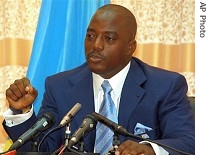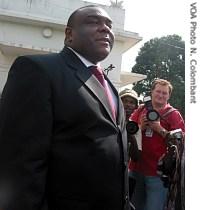Schwarz report (Real Audio) - Download 345K
In the Democratic Republic of Congo, human-rights organizations say they are not reassured by President Joseph Kabila's statement that the military action that left dozens dead last week was necessary to maintain peace. They say the way to national reconciliation is open dialogue and space for a strong opposition. Naomi Schwarz has this story from VOA's regional bureau in Dakar.
![]()
Listen to Schwarz report (Real Audio) ![]()
In a press conference Monday, Congolese president Joseph Kabila said the situation that led to two days of violent battles was military, not political.

Joseph Kabila holds press conference in Kinshasa, 26 Mar 2007
Mr. Kabila said it was necessary at all costs to re-establish order as quickly as possible. If you do not have peace, he said, you have nothing.
At the press conference, Mr. Kabila accused opposition leader and former Vice President Jean-Pierre Bemba of attempting to seize control of part of the capital, Kinshasa. The state has issued a warrant for Bemba's arrest, under charges of high treason and says his actions constituted a rebellion.
But some observers say the events leading to the fatal clashes are murky.
Rostin Manketa, an investigator for the Kinshasa-based human rights organization Voice for the Voiceless, said, "We are launching an independent investigation in order to clear the matter, to clear everything, on what happened, to know exactly who started, who opened fire first."
He says, whatever the investigation turns up, he is not convinced by Mr. Kabila's assertion that the problem required an immediate military response.
 |
| Jean-Pierre Bemba |
"That is why for the sake of peace, the sake of national reconciliation, I do not think that the head of state was right to resort to arms just to settle the matter," Manketa explained.
In November, Bemba came in second place in elections that were widely hailed as a crucial step toward democracy after more than four decades of civil war since independence.
Manketa says for the young democracy to move forward, the DRC's leaders need to allow opposition voices to be heard. But he says he fears Mr. Kabila is trying to consolidate his power by quashing his rivals.
Local journalist Eddy Isango says this is a fear others share.
Isango says many worry Mr. Kabila's violent reaction last week will intimidate other members of the opposition.
Bemba has said he fears for his safety. Prior to last week's incidents, he had refused to integrate his guard into the national military for this reason. He remains in the South African Embassy where he took refuge last Thursday, and says he may go into exile if he cannot be assured of his safety.
Related articles
- • Felix Tshisekedi Sworn In as DR Congo President (January 24, 2019)
- • Constitutional Court Declares Tshisekedi Winner of Presidential Election (January 19, 2019)
- • Felix Tshisekedi Vows to Be the President of All Congolese (January 10, 2019)
- • Felix Tshisekedi Elected DR Congo President (January 10, 2019)
- • DR Congo Delays Results of December Election (January 6, 2019)
- • Botswana Urges Joseph Kabila to Step Down (February 26, 2018)
- • No elections in DR Congo in December without electronic voting machines: INEC (February 13, 2018)
- • US Warns DR Congo Against Electronic Voting for Delayed Election (February 12, 2018)
- • Felix Tshisekedi accuses INEC of illegally prolonging Kabila's mandate (October 24, 2017)
- • DRC Seeks Arrest of Presidential Candidate Moise Katumbi (May 19, 2016)
- • Papa Wemba Is Buried in Kinshasa (May 4, 2016)
- • Papa Wemba Awarded Highest National Honor as Thousands Pay Tribute (May 2, 2016)
- • Rights Groups: DR Congo Must Free Pro-democracy Activists (April 13, 2015)
- • Police Open Fire on Crowd Protesting Election Law Change (January 19, 2015)
- • Etienne Tshisekedi Evacuated to Belgium for Medical Treatment (August 16, 2014)
- • Kerry Calls on Kabila to Honor Constitution (May 4, 2014)
- • Kerry in DR Congo for Security Talks (May 3, 2014)
- • DR Congo Takes Chairmanship of COMESA at Summit in Kinshasa (February 26, 2014)
- • DR Congo Honors Nelson Mandela, Hero and Model for Humanity (December 6, 2013)
- • Kabila Congratulates Congo Army for Defeating M23 Rebels (October 30, 2013)
- • DR Congo Eases Process for Starting a New Business (June 3, 2013)
- • Regional Leaders Sign DR Congo Peace Deal (February 24, 2013)
- • The M23 Rebels Want to Overthrow Kabila? Nonsense (November 28, 2012)
- • Protests Against M23 Rebels, Government and UN Spread (November 22, 2012)
- • Thousands Protest M23 Capture of Goma, Turn on Government and UN (November 21, 2012)
- • DR Congo Officials Vow to Defend Goma Against M23 Rebels (November 19, 2012)
- • At high-level meeting, Ban urges political solution to crisis in eastern DR Congo (September 27, 2012)
- • US Cuts Military Aid to Rwanda Over Support to Rebels in DR Congo (July 21, 2012)
- • DR Congo, Rwanda Sign Pact to Fight Rebels in Eastern Congo (July 15, 2012)
- • Police Investigate Former Prime Minister for Corruption (May 14, 2012)







